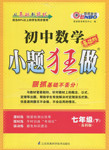题目内容
A young man named Charles Lyell had different ideas.He wrote a book about them called Principles of Geology(地质学).The earth,according to Lyell,was not only thousands of years old,it was millions of years old.As to(关于) the common belief that changes in the earth's surface happen suddenly because of a single earthquake or flood,he said that this might happen once in a while,but usually these changes took place very slowly. He believed that the surface of the earth had been changing from the beginning of time. The changes,he said,were caused by the long?term action of the winds and seas,and by forces such as volcanoes breaking out under the earth's surface.Once in a great while he thought,a mountain might appear for the first time after an earthquake.But usually mountains would rise slowly and steadily.?Professor Henslow was interested in Lyell's ideas,but he did not actually believe them.Charles Darwin could not make up his mind about them.But they set him thinking along lines which would later change the beliefs of thoughtful people all over the world.?
At Cambridge,Charles Darwin studied just enough to pass the examination,and received his college degree in 1831.During this time,he had become more and more interested in geology.At the end of the school year,he went to North Wales with one of his teachers to examine the rock formations(构成) and to search for fossils(化石).Fossils are the remains of ancient living things.They are usually found fixed in rocks in the earth's crust(地壳).Fossils may be of animals,such as fish,insects,birds,or humans. They may be of plants from tiny leaves to huge trees.
When a living creature dies,it usually decays(腐烂)or is eaten by animals.However,if it sinks into a riverbed(河床) or is quickly covered by the blowing sands of a desert storm,the bones are kept up in the earth.Over many years the soft inner parts of a bone disappear,leaving the inside hollow(空的).Water containing mineral enters into the hollow.Slowly the mineral hardens and makes the bone hard and heavy,like stone.?
1.According to Charles Lyell,it is mainly ______ that the earth has been formed like today's shape.
A.from the beginning of time?
B.past some experiences of big flood?
C.over a very long period of years?
D.because of several big earthquakes
2.Charles Lyell believed the fact that a mountain is formed ______.?
A.more by seas than by volcanoes?
B.more slowly than suddenly?
C.more by an earthquake than by winds?
D.more steadily than quickly
3.Unlike Professor Henslow,Charles Darwin ______.
A.never thought Lyell's ideas were right?
B.did made up his mind not to accept Lyell's ideas?
C.thought about what the world were then thinking about?
D.thought over Lyell's ideas and developed them
4.The main purpose of Darwin's going to North Wales was to ______.?
A.make a study of fossils?
B.appreciate the rock information?
C.to do research work into dead animals?
D.look for plants from tiny leaves to huge trees
5.In which order are fossils formed?
a.A living thing sinks into a riverbed or sands.?
b.Water goes into a bone hollow together with mineral.?
c.Something soft in a bone disappears.?
d.The hardened mineral makes the bone hard.
e.The bone becomes hollow inside.?
A.a b c d e
B.c a b e d
C.a c e b d
D.e c d b a
解析:

 轻松课堂单元测试AB卷系列答案
轻松课堂单元测试AB卷系列答案 小题狂做系列答案
小题狂做系列答案完形填空
阅读下列短文,掌握其大意,然后从1-25各题所给的四个选项中,选出一个最佳答案
In the past, American families tended __1__ quite large,and parents __2__ five or __3__ children were common. Over the years the __4__ of the family has decreased(减少). One reason for this is __5__ in the cost of __6__. On the average, children attend schools for more years __7__ they __8__, making them financially dependent __9__ their families longer. Moreover, children nowadays are better __10__ and have __11__ money to spend __12__ entertainment. The parents usually take the responsibility __13__ all the expenses.
Meanwhile, families are __14__ close than they used to be. More and more American mothers work away from home. The break up of the family occurs when the parents divorce(离婚). A lot of children in the U.S. live part of their young __15__ with only one parent. __16__ families usually result in problems for children and parents alike. Children blame themselves when their parents __17__. They __18__ feeling unsettled as they are moved back and forth between parents.
Usually one parent takes the responsibility for raising the children. These single parents must __19__ the children's emotional and psychological needs while also __20__ them financially. This is very demanding and leaves very little time for the parent's own personal interests. Single parents often marry other single parents. In this type of family, unrelated children are forced to __21__ brother or sister relationship.
The situations of many American __22__ today are not good. However, recent signs indicate that things are getting __23__. The divorce rate is declining. The rate of __24__ is rising. Perhaps Americans have learned __25__ important families are.
|
(1) A. to be |
B. to form |
C. to turn |
D. to become |
[ ] |
|
(2) A. had |
B. raising |
C. rising |
D. lost |
[ ] |
|
(3) A. six |
B. less |
C. more |
D. four |
[ ] |
|
(4) A. size |
B. number |
C. amount |
D. change |
[ ] |
|
(5) A. a drop |
B. a decrease |
C. amount |
D. change |
[ ] |
|
(6) A. house |
B. food |
C. clothing |
D. living |
[ ] |
|
(7) A. than |
B. when |
C. as |
D. like |
[ ] |
|
(8) A. do |
B. have |
C. had |
D. used to |
[ ] |
|
(9) A. to |
B. on |
C. for |
D. against |
[ ] |
|
(10) A. dressed |
B. worn |
C. dressing |
D. wearing |
[ ] |
|
(11) A. less |
B. fewer |
C. more |
D. most |
[ ] |
|
(12) A. in |
B. at |
C. on |
D. to |
[ ] |
|
(13) A. for |
B. to |
C. by |
D. into |
[ ] |
|
(14) A. more |
B. little |
C. less |
D. fewer |
[ ] |
|
(15) A. time |
B. childhood |
C. ages |
D. lives |
[ ] |
|
(16) A. Divorced |
B. Broken |
C. Deserted |
D. Remarried |
[ ] |
|
(17) A. separate |
B. quarrel |
C. fight |
D. leave |
[ ] |
|
(18) A. grown up |
B. build up |
C. set up |
D. made up |
[ ] |
|
(19) A. have lest |
B. give |
C. care for |
D. offer |
[ ] |
|
(20) A. supporting |
B. opposing |
C. indicating |
D. showing |
[ ] |
|
(21) A. defend |
B. prove |
C. indicate |
D. develop |
[ ] |
|
(22) A. cities |
B. towns |
C. families |
D. villages |
[ ] |
|
(23) A. better |
B. worse |
C. fewer |
D. newer |
[ ] |
|
(24) A. death |
B. marriage |
C. deserts |
D. children |
[ ] |
|
(25) A. how |
B. what |
C. that |
D. why |
[ ] |